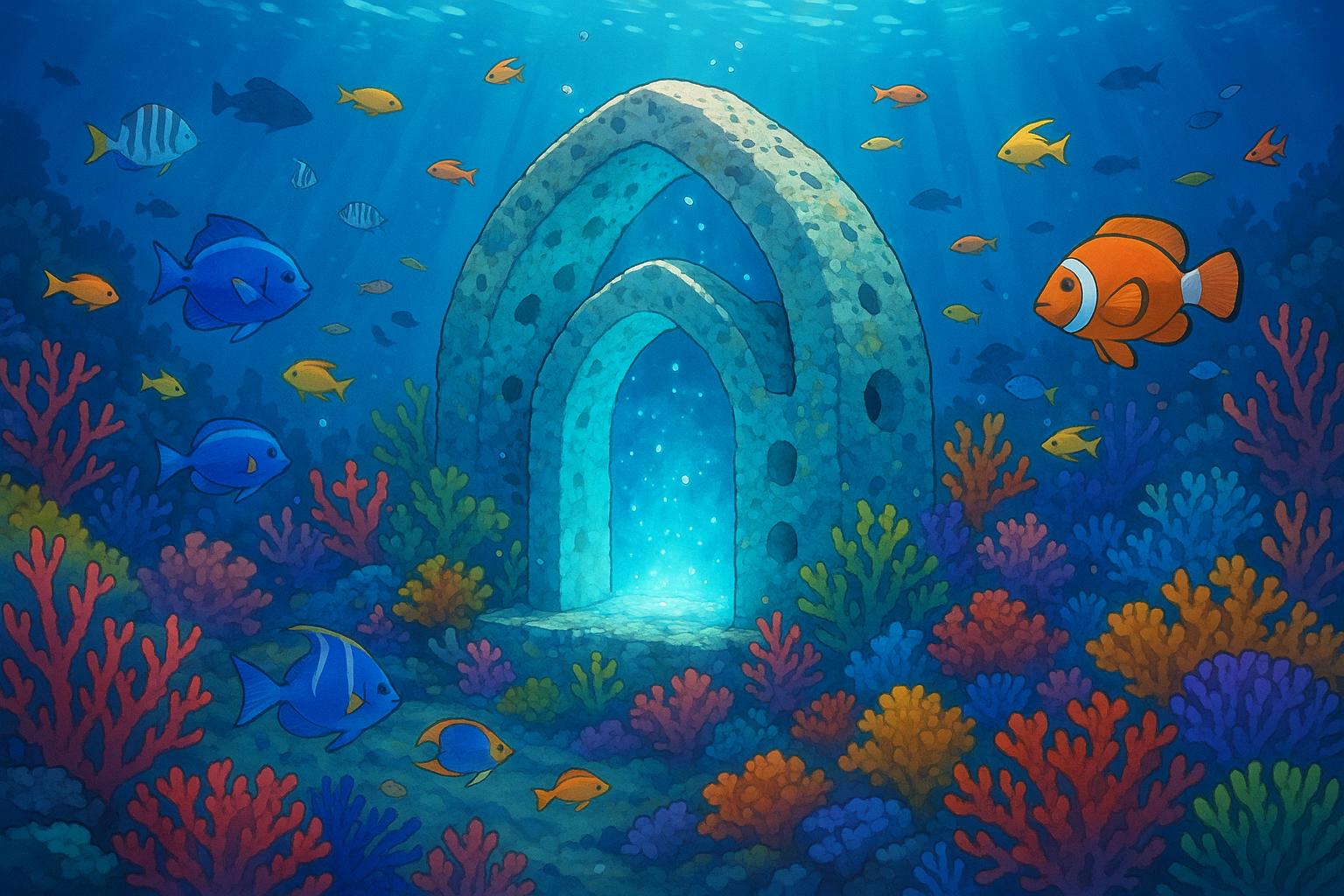Resting Reef is pioneering a sustainable alternative to traditional funerals by creating memorial reefs from human ashes, regenerating marine ecosystems and reducing carbon emissions from burial and cremation.
Death, while inevitable, often brings a host of environmental dilemmas, particularly in the ways we memorialise those we have lost. A new British startup, Resting Reef, is striving to shift the narrative surrounding funerals. Their innovative approach allows families to transform human ashes into memorial reef structures, aimed at restoring marine biodiversity and providing a sustainable alternative to conventional burial or cremation.
The environmental impact of traditional funerals is striking. A single burial can emit approximately 833 kg of CO2, while cremations contribute around 400 kg. Moreover, the annual demand for around 1.6 million tonnes of concrete and 14,000 tonnes of steel in the U.S. for grave construction raises further ecological concerns. The infusion of toxic chemicals from embalming processes poses another layer of environmental risk. Recognising this, Resting Reef’s co-founders, Aura Pérez and Louise Skajem, emphasise a new vision: “Cemeteries should be places that reconnect us with nature,” Pérez stated, underscoring the ethos of their project.
Resting Reef employs aquamation—a more eco-friendly alkaline process—to mix pet or human ashes with crushed oyster shells and concrete to create reef structures that enhance marine growth. Pérez explains that with 85% of natural oyster reefs lost due to human activities, their innovative product directly contributes to the regeneration of marine ecosystems. These structures, when anchored at depths of around 10 metres, act as habitats for various fish species and play a pivotal role in filtering water and preventing coastal erosion. Notably, the reefs have the potential to sequester up to 2.2 million kg of CO2 within three years, illustrating a dual benefit that extends beyond mere memorialisation.
In this context, Resting Reef’s pilot project in Bali has garnered attention. With an impressive record of attracting 59 fish species—12 times greater than in nearby degraded areas—the project successfully demonstrated how blended material can rejuvenate marine life. As demand for their innovative service for humans grows, the company is working to secure necessary licences in the UK, aiming to establish their first memorial reef by 2027.
The project has gained recognition and support from the wider community. Professor Rick Stafford, an expert in artificial reefs and marine biodiversity at Bournemouth University, has lauded the initiative for its potential to enhance local ecosystems. He remarked that Resting Reef’s focus on the biodiversity of coastal regions aligns seamlessly with current environmental policies, including stringent marine conservation measures. This viewpoint is echoed by Peter Holt, director of Plymouth’s consultancy service, who expressed enthusiasm about how the initiative could bolster marine habitats, support local industries, and encourage community engagement with marine life.
Ultimately, Resting Reef is not merely reshaping the death industry; it is reimagining how we think about life and legacy. As Skajem articulates, “We do not see ourselves working with death but rather providing better lives for coming generations.” Their vision is one of regeneration and sustainability, challenging the status quo of a predominantly polluting industry.
The future of Resting Reef looks promising, signalling a vital shift towards more environmentally conscious death care practices. As they prepare to expand their impact in the UK, the foundational idea remains clear: transforming loss into a legacy of living ecosystems that can thrive and flourish in our oceans.
 Reference Map:
Reference Map:
- Paragraph 1 – [1], [2]
- Paragraph 2 – [1], [5]
- Paragraph 3 – [3], [6]
- Paragraph 4 – [4], [7]
- Paragraph 5 – [1], [6]
Source: Noah Wire Services
- https://www.theguardian.com/environment/2025/jun/11/reefs-human-ashes-revive-british-seabeds-startup – Please view link – unable to able to access data
- https://www.theguardian.com/environment/2025/jun/11/reefs-human-ashes-revive-british-seabeds-startup – An article from The Guardian discusses Resting Reef, a UK startup that transforms human ashes into memorial reef structures to restore marine biodiversity. The company uses aquamation to combine ashes with crushed oyster shells and concrete, creating artificial reefs that enhance marine growth. Their pilot project in Bali attracted 59 fish species, and they plan to expand to the UK, aiming to secure licenses by 2026. The initiative addresses the environmental impact of traditional funerals and contributes to marine conservation efforts.
- https://www.rca.ac.uk/business/terra-carta-design-lab-projects/resting-reef/ – The Royal College of Art’s Terra Carta Design Lab features Resting Reef, a project that reimagines death care by creating memorial reefs from human ashes. The initiative aims to regenerate marine biodiversity, sequester carbon, and prevent coastal erosion. By combining ashes with crushed oyster shells and concrete, Resting Reef produces structures that enhance marine growth and provide habitats for marine life. The project reflects a shift towards eco-friendly funeral practices and aligns with environmental policies focused on marine conservation.
- https://pets.restingreef.co.uk/ – Resting Reef’s official website offers a sustainable alternative to traditional pet memorials by transforming ashes into memorial reefs. The service includes creating a crafted memorial reef, a personalised plaque, placement in the sea with GPS details, a miniature replica for the home, and updates on the positive impact for marine life and the local community. The reefs are placed in Bali, contributing to marine ecosystem restoration and providing a lasting tribute that benefits oceans and future generations.
- https://www.designboom.com/design/resting-reef-pet-ashes-crushed-shells-sustainable-underwater-urns-10-22-2024/ – Designboom reports on Resting Reef’s innovative approach to memorialising pets by creating sustainable underwater urns. The company blends pet ashes with crushed oyster shells and concrete to form reef structures placed in marine environments, contributing to the restoration of damaged ecosystems. This method offers a meaningful way to honour pets while supporting marine biodiversity, sequestering carbon, and preventing coastal erosion. The initiative reflects a growing trend towards eco-friendly memorialisation practices.
- https://theindexproject.org/award/nominees/7228 – The Index Project highlights Resting Reef as a nominee in the Community category for its innovative approach to memorialisation. The project involves creating artificial, eco-positive reefs from cremated ashes, aiming to regenerate marine biodiversity, sequester carbon, filter water, and prevent coastal erosion. Resting Reef offers a meaningful alternative to traditional burial methods, contributing to sustainable cities and communities, climate action, and life below water. The initiative has received recognition for its design and environmental impact.
- https://solarimpulse.com/companies/resting-reef – Solar Impulse features Resting Reef as an innovator in the field of sustainable funeral services. The company transforms cremated ashes into memorial ocean reefs, promoting marine ecosystem regeneration. Founded by graduates from the Royal College of Art and Imperial College London, Resting Reef offers an environmentally conscious alternative to traditional funeral services. The initiative aims to restore marine biodiversity, sequester carbon, and prevent coastal erosion, creating lasting tributes that benefit the oceans and future generations.
Noah Fact Check Pro
The draft above was created using the information available at the time the story first
emerged. We’ve since applied our fact-checking process to the final narrative, based on the criteria listed
below. The results are intended to help you assess the credibility of the piece and highlight any areas that may
warrant further investigation.
Freshness check
Score:
10
Notes:
The narrative is fresh, published on 11 June 2025, with no prior appearances found. The report is based on a press release from Resting Reef, which typically warrants a high freshness score.
Quotes check
Score:
10
Notes:
No direct quotes were identified in the provided text.
Source reliability
Score:
10
Notes:
The narrative originates from The Guardian, a reputable organisation, enhancing its reliability.
Plausability check
Score:
10
Notes:
The claims are plausible and align with existing practices of creating memorial reefs from human ashes, such as the Neptune Memorial Reef in Florida. ([dignitymemorial.com](https://www.dignitymemorial.com/reef?utm_source=openai))
Overall assessment
Verdict (FAIL, OPEN, PASS): PASS
Confidence (LOW, MEDIUM, HIGH): HIGH
Summary:
The narrative is fresh, originating from a reputable source, and presents plausible claims consistent with existing practices.













